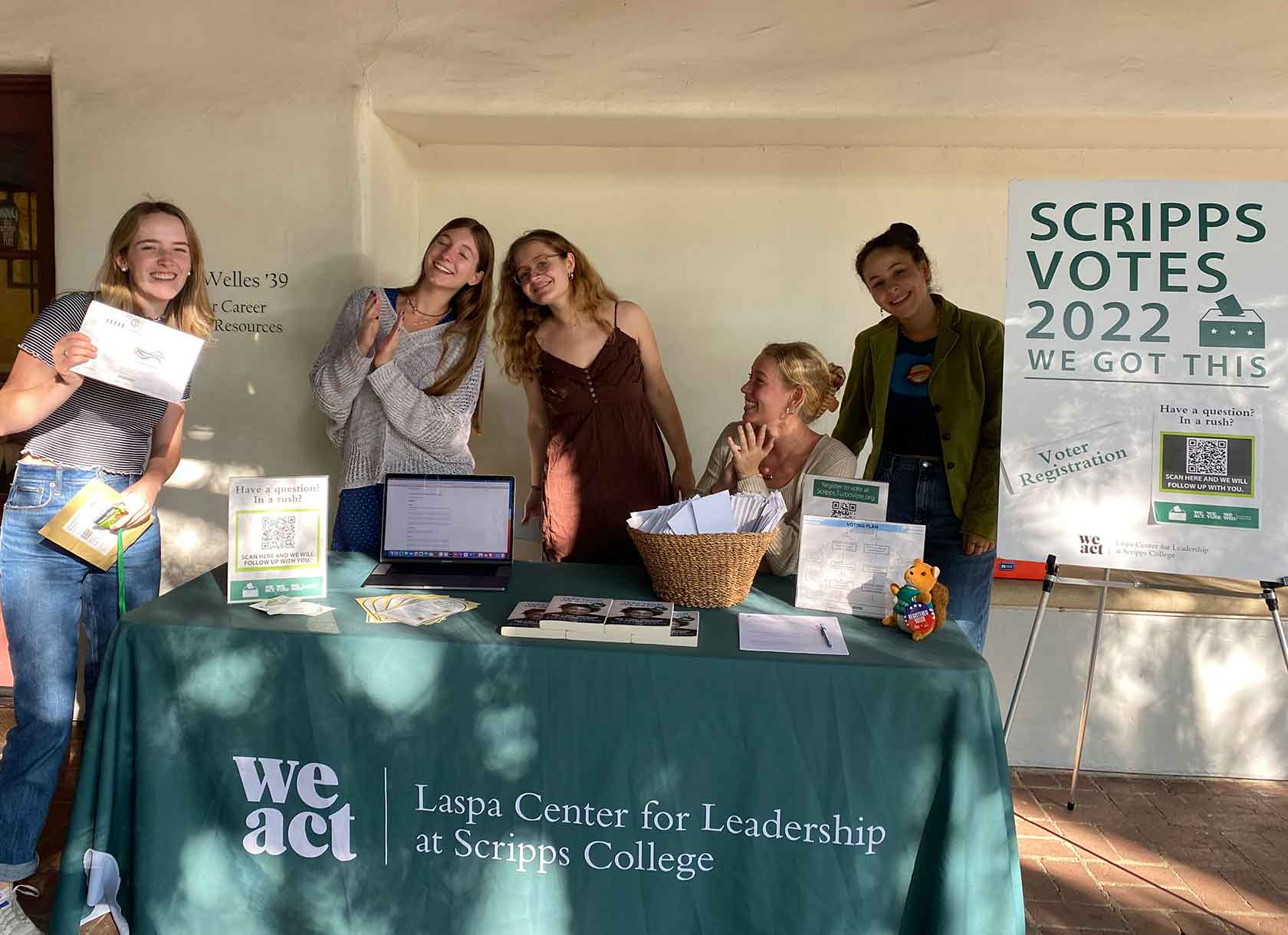
This fall, the Laspa Center for Leadership student voter engagement team has been hard at work registering their classmates to vote. At tables across campus, these Scholars-in-Action—who help organize and support all Laspa Center programming throughout the year—have headlined the “Scripps Votes 2022” effort, providing absentee ballots, fielding questions about voting logistics, and registering students to vote.
When politics and environmental analysis major Catherine Protiva ’24 learned about the Scripps Votes 2022 registration drives, she knew this was the Laspa Center offering she wanted to be involved in. “I am very invested in political issues that are up for grabs this midterm, so I jumped at the opportunity to make an impact through getting people at Scripps registered to vote,” she says.
Scripps Votes 2022 is part of the Laspa Center’s Civic Engagement Initiative, a nonpartisan initiative comprised of three basic arms: voter registration, education, and empowerment. In addition to registering Scripps students to vote in real time, Scholars-in-Action have participated in efforts such as Vote Forward, a nonpartisan campaign that aims to increase voter turnout nationwide by sending personalized letters to registered voters who do not regularly cast a ballot.
“I think leadership at its core means making your voice heard and collaborating with others to achieve what you want,” says Jane Lovett ’25, an anthropology major who has organized letter-writing tables on campus. “Especially with the midterms, there are a lot of things on the ballot, in terms of local elections, that are really important. We just want to get our voices out there so that we have autonomy over our experience in this country.”
A History of Civic Engagement
The Laspa Center’s current voter registration push began in fall 2019, with the goal of preparing students to vote in the upcoming 2020 general election primaries.
“It was a fantastic opportunity to give students the chance to focus on other aspects of the election cycle, how the two-party system plays itself out in different states and jurisdictions,” says Gretchen Maldonado, interim director of the Laspa Center. “With the 2019 primary drive, students were surprised that we were already talking about the national election. But if you’re an engaged citizen, you’re always paying attention.”
Maldonado notes that Scripps students were clearly paying attention. Despite the community engagement challenges presented by the pandemic, the 2020 initiative was wildly successful: 86.6 percent of registered Scripps student voters participated in that year’s national election, according to Tufts University’s National Study of Learning Voting Engagement, which matches voting rolls against school registration rolls with non-identifiable markers. That stellar voting rate earned the College a “Platinum Seal” from the ALL IN Campus Democracy Challenge, a nonpartisan political engagement organization that focuses on college students.
Lucy Dustman ’23, an economics major who manages the Laspa Center’s social media accounts and promotion for events such as the voter registration and letter-writing tables, wants this year’s turnout to surpass Scripps’ previous record. “I think it would be really amazing if we could go even higher than that this year, just because that shows that we’re engaged and we’re fighting for what we believe in,” she says.
The 2020 general election wasn’t the first cycle in which Scripps students voted in overwhelming numbers. Scripps’ 2018 voting rate was 30 points above the national average for midterm elections, which generally produce much lower voter turnout than presidential primary and general election cycles. Maldonado expects that the trend will continue through the 2022 midterms, for which she hopes to see at least 70 percent student voter turnout.
Diana Reiss ’25, a history and media studies major who previously received a Laspa Fellowship and a We Act Grant, notes that it’s vital to provide concrete support during a process that can sometimes be logistically complex. She believes that the Scripps Votes 2022 campaign serves as an “intermediate step” when it comes to casting a ballot, especially for first-time voters.
“Particularly on a campus like Scripps, people really do care about civic engagement,” she says. “And yet, especially because of the convoluted instructions for certain states, voting can be challenging and alienating. The Laspa Center hopes to help students tackle this process to promote as much as engagement as possible.”
Voting to Make a Difference
Maldonado believes that recent turnout has been motivated in part by the results of the 2016 presidential election. “I don’t think students expected the outcome to be what it was, and I think that galvanized our population,” she says. “Because that election was so close and the numbers mattered so much, students could easily see how an individual person’s vote can make a difference, and they’ve turned out.”
The issues driving students to the ballot box for the 2022 midterms include voter suppression and the overturning of Roe v. Wade. Maldonado explains that students’ desire to “go out and do something” is strong, with many students asking about the logistics of voting if they’re registered in another state, or wondering how to request an absentee ballot, change their voter registration to Claremont, or vote by mail.
“The experience of students realizing all the implications of losing that fundamental right is striking, moving, and sad—but they don’t feel helpless,” she says. “They don’t feel like they have no chance to do something about this. What’s inspiring is that they do feel that power.”
Adds Lovett: “It makes me feel like I’m making a difference when people come up to us at tabling events and we register them to vote and we have them check their ballot. Even having one more person be involved is a good thing.”

